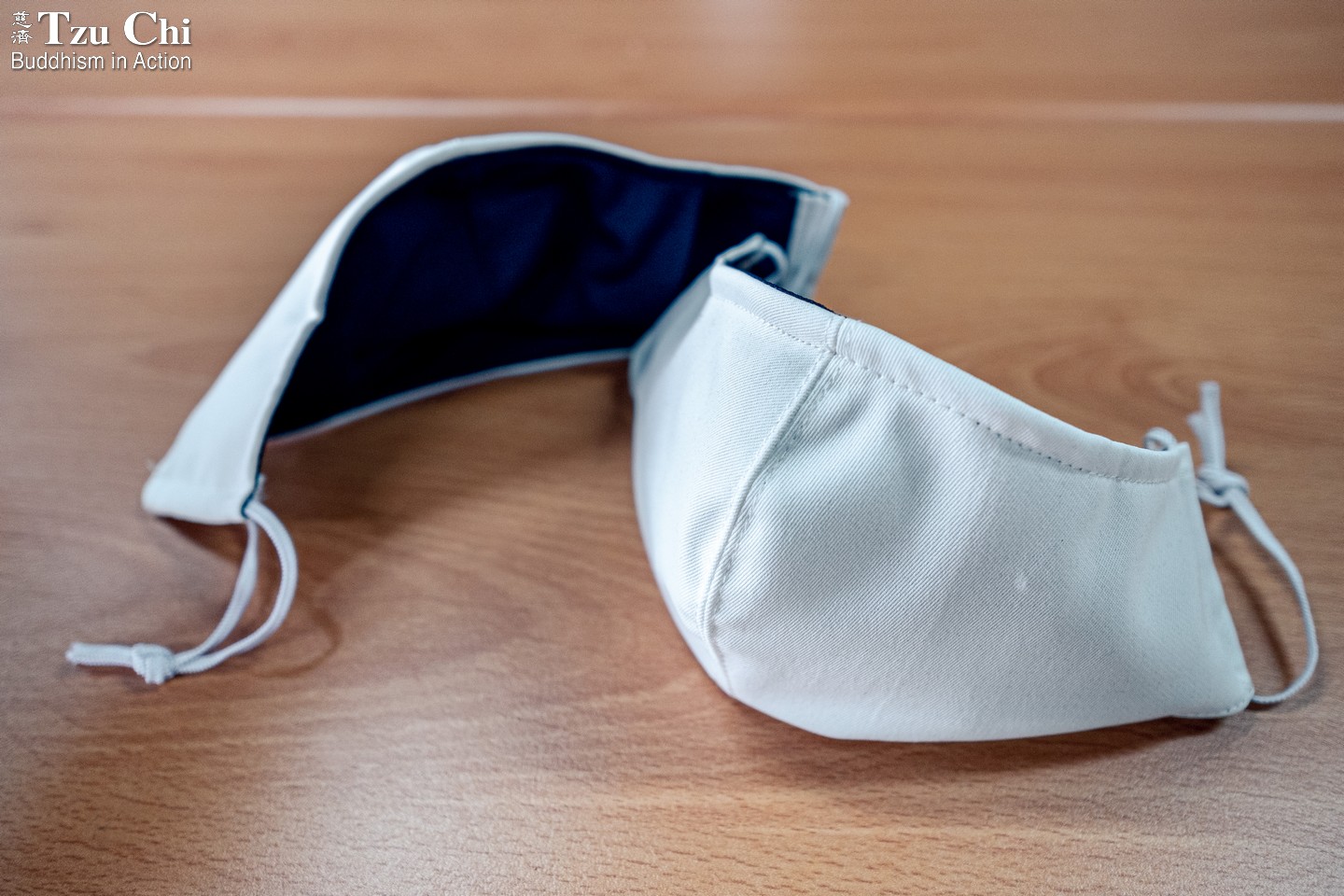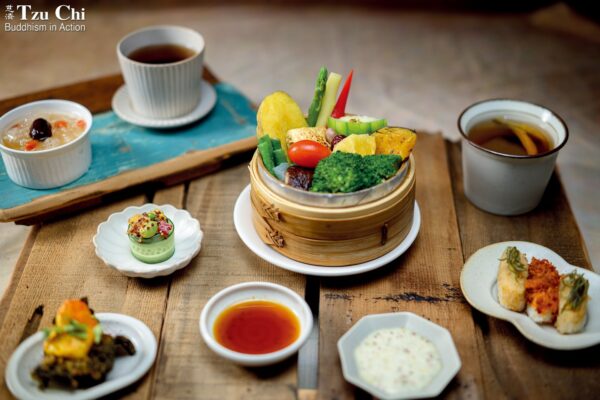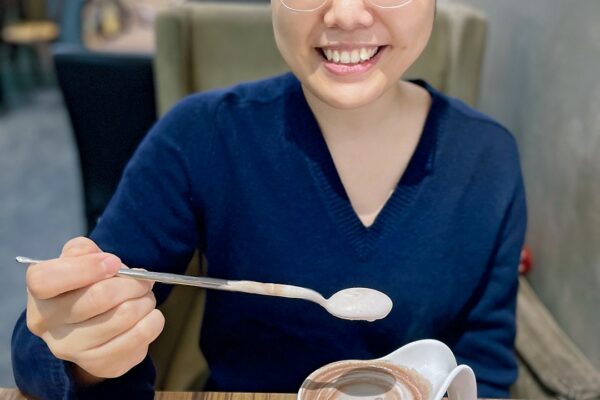By Li Shu-yun
Translated by Wu Hsiao-ting
Photos by Huang Xiao-zhe
The first confirmed coronavirus case in Taiwan on January 21 was followed by a shortage of face masks. Seeing the need, Tzu Chi volunteers jumped in to help relieve the shortage. Their actions proved once again the truth of their maxim: “We’ll be wherever we are needed.”
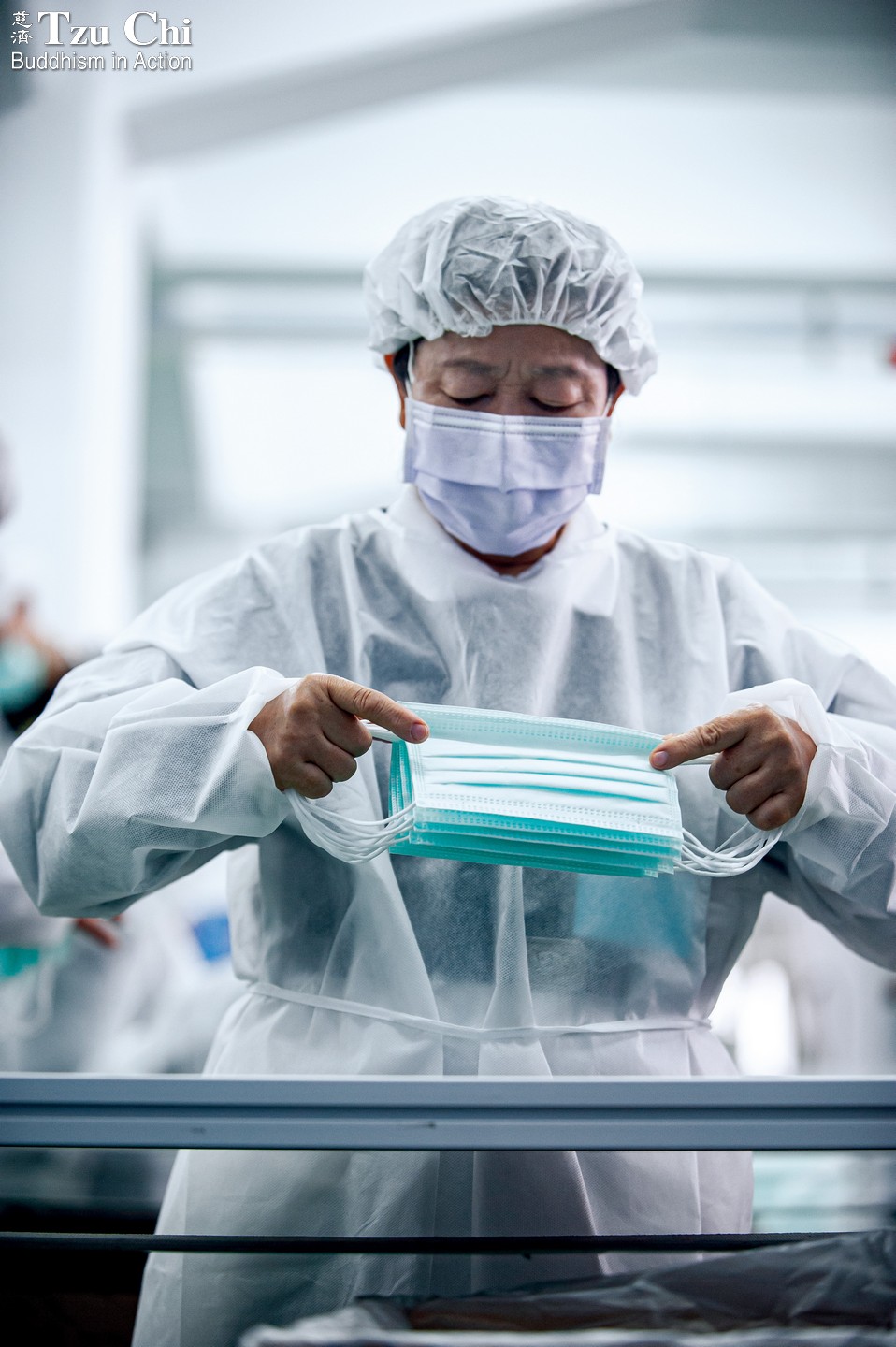
A Tzu Chi volunteer puts masks in order at a face mask factory. Adhering to a strict protocol, volunteers must clean and sanitize their hands and wear appropriate clothing before entering the workspace.
The weather was clear without a cloud in the sky when I arrived at a face mask factory in Baihe, Tainan, southern Taiwan. Other than the factory itself, the area looked deserted. I had to follow a strict protocol when I entered, donning a clean room outfit before having dust blown off me. Only then was I allowed into the dust-free production area.
The production area was noisy. The machines produced incessant, high-pitched sounds that grated on my eardrums. However, the factory workers and Tzu Chi volunteers inside seemed completely unperturbed by the noise as they adroitly checked the quality of masks and packaged them. Like me, they all wore clean room caps, clothing, and masks. Unlike me, they had to be in those outfits for hours on end.
As an emergency measure against the spread of the novel coronovirus infection, the Taiwanese government began directing the operation of selected mask factories in Taiwan on January 31, 2020. The goal was to produce masks 24 hours a day, seven days a week. Those efforts grew until the government was coordinating production at 66 factories across Taiwan. Taiwan’s armed forces were mobilized to help. Tzu Chi volunteers were invited to join the factory I was visiting to render their voluntary services, too. They started there on February 10, working alongside soldiers and factory employees to help boost mask supply.
Blessed to give
“This is nothing difficult,” said volunteer Yang Qiu-rong (楊秋絨). “I feel blessed to be able to participate in any volunteer work, so here I am.” Yang is 68 years old, but looks a lot younger than her age. She received her Tzu Chi volunteer certification 25 years ago, in 1995. She told me with a smile that she used to be a hairdresser but now spends most of her time babysitting her grandchild. When she learned in early February that help was needed on face mask production lines, she jumped at the chance to come on board.
She had no idea when she volunteered where she would go to help or what kind of work she would be required to do. But that didn’t matter to her. All she knew was that volunteers were needed, and that was enough for her to step forward. “I believed I’d be up to the job. Since I could make myself useful, I reached out. The only thing I knew for certain was that this would be a good chance for me to give to society.”
Yang explained to me that her job was to inspect the quality of masks and pack them up. It was easy, she said. Factory employees were responsible for more complicated work, such as operating the machines, leaving simpler work to volunteers like her, who joined the production lines on a daily rotation basis. Simple jobs were best for the new people that came on board every day, since it didn’t take much time to learn the ropes.
Though her work was quite repetitive, Yang didn’t find it boring at all. She had never worked in a factory before, so this was a brand-new experience for her. She found it more interesting than she had imagined. She reflected and said, “Frankly speaking, if we hadn’t been asked to help, we wouldn’t have been able to come to the factory and contribute at a time like this. I really cherish this opportunity to be of service. Furthermore, helping others is itself a great source of joy.”
Seeing how much she enjoyed giving of herself made me think of all the Tzu Chi volunteers doing what they could for the COVID-19 outbreak. Take those volunteers who are good at sewing. The high demand for face masks in Taiwan has provided the opportunity for them to make cloth masks and mask covers. People can slip medical masks into covers made by the volunteers to protect the masks and prolong their life. Both the cloth masks and mask covers have the added benefit of being environmentally friendly, since they can be washed and used repeatedly.
Tzu Chi has sewing workshops at some of its facilities across Taiwan. In normal times, volunteers at the workshops create handicrafts such as bags out of recycled or donated fabrics. During this pandemic, they put their skills to good use by making cloth masks and mask covers. Volunteers first worked out the prototypes for the masks and covers with Master De Pei (德佩) at the Jing Si Abode, then went to work. Some garment manufacturers joined in the effort by generously lending out sewing machines and mobilizing professional seamstresses to help. From February 10 to March 15 alone, volunteers put in 9,100 shifts and turned out more than 87,000 masks and covers.
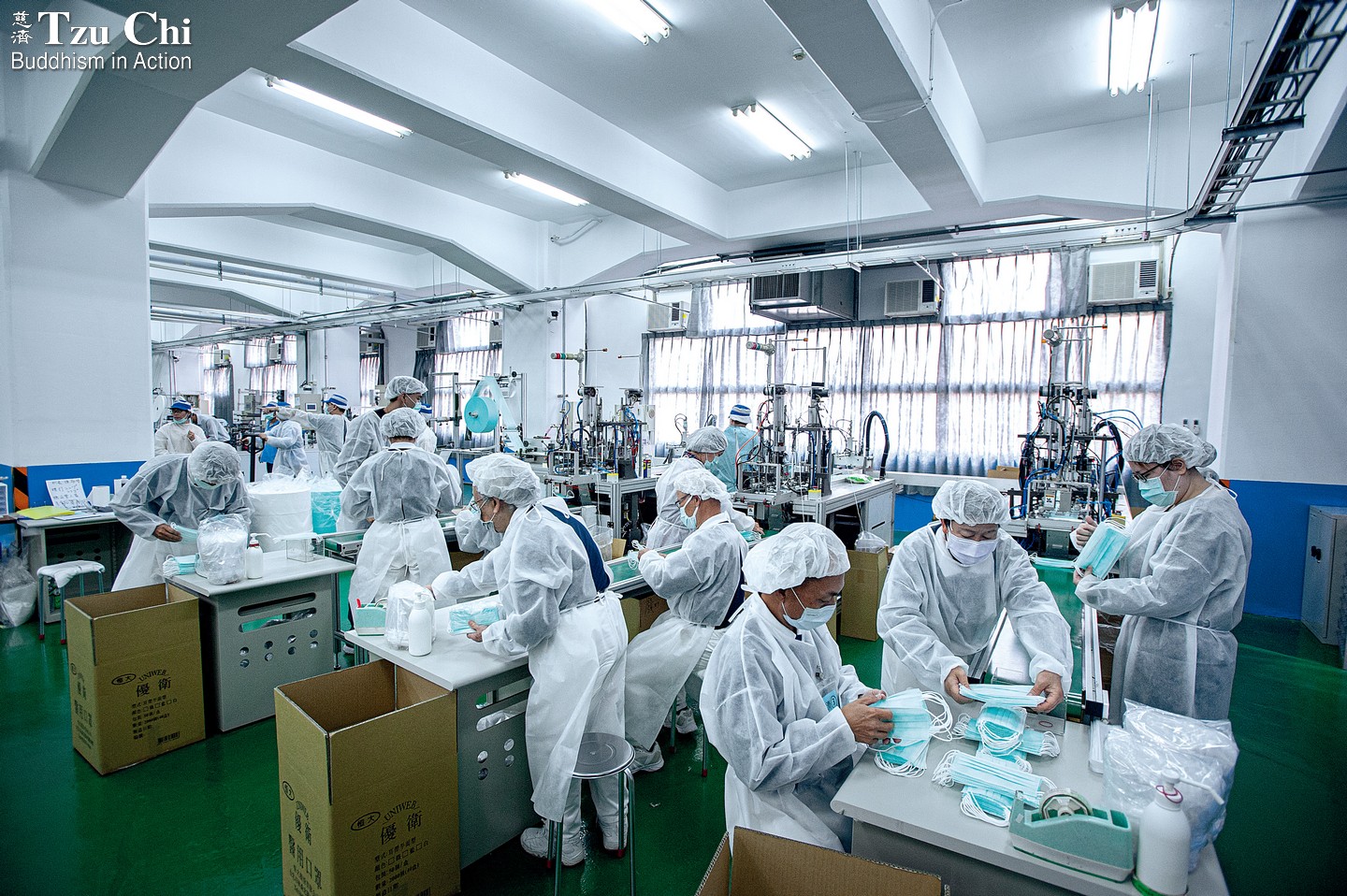
Tzu Chi volunteers work a day shift at a face mask factory in Baihe, southern Taiwan, in an effort to ratchet up production to meet the shortfall.
Spending time on benefiting mankind
I met Cai Yue-li (蔡月麗), 60, at one such workshop in Shanhua, southern Taiwan. She was responsible for teaching other volunteers at the workshop how to make cloth masks. She is outgoing, chipper, and likes to sew. She is one of the veterans at this workshop, having established it with other volunteers 12 years ago.
Cai used to help at her husband’s roll-up door company. Back then, she would go to her husband’s company at four in the afternoon and take care of things that needed her attention. Time outside of that was free for her, so she usually went shopping or had afternoon tea with her friends. After she semi-retired, she began spending most of her time teaching at the workshop.
She never imagined back then that she would end up at the workshop, let alone become a teacher, but she feels that her time is better spent at the workshop than on shopping or socializing. Volunteering is a fulfilling way to pass her time, and she is happy that she can use her sewing skills in the fight against the pandemic. Though it is not hard to make a mask, she emphasized the importance of being mindful in the process, especially when it comes to teaching other volunteers how to make one. If she makes a mistake in how she teaches others, her error could be multiplied many times over.
Every volunteer at the workshop was good at sewing. “We help each other and learn from each other,” she remarked as she picked up a mask sample. “We worked together to streamline the process so that the end products would be consistent in quality.”
She said that most of the volunteers that came to the workshop no longer worked in the sewing trade, but their skills were still there—they just needed some refreshing. “We learn as we go,” she said. “The happiest things for me in the current stage of my life are learning and sharing.” Many people in the world live in hardship, she said. She felt that we shouldn’t think too much or dwell on our own miseries. Instead, we should strive to make the most out of our lives so that we won’t have any regrets when we get old.
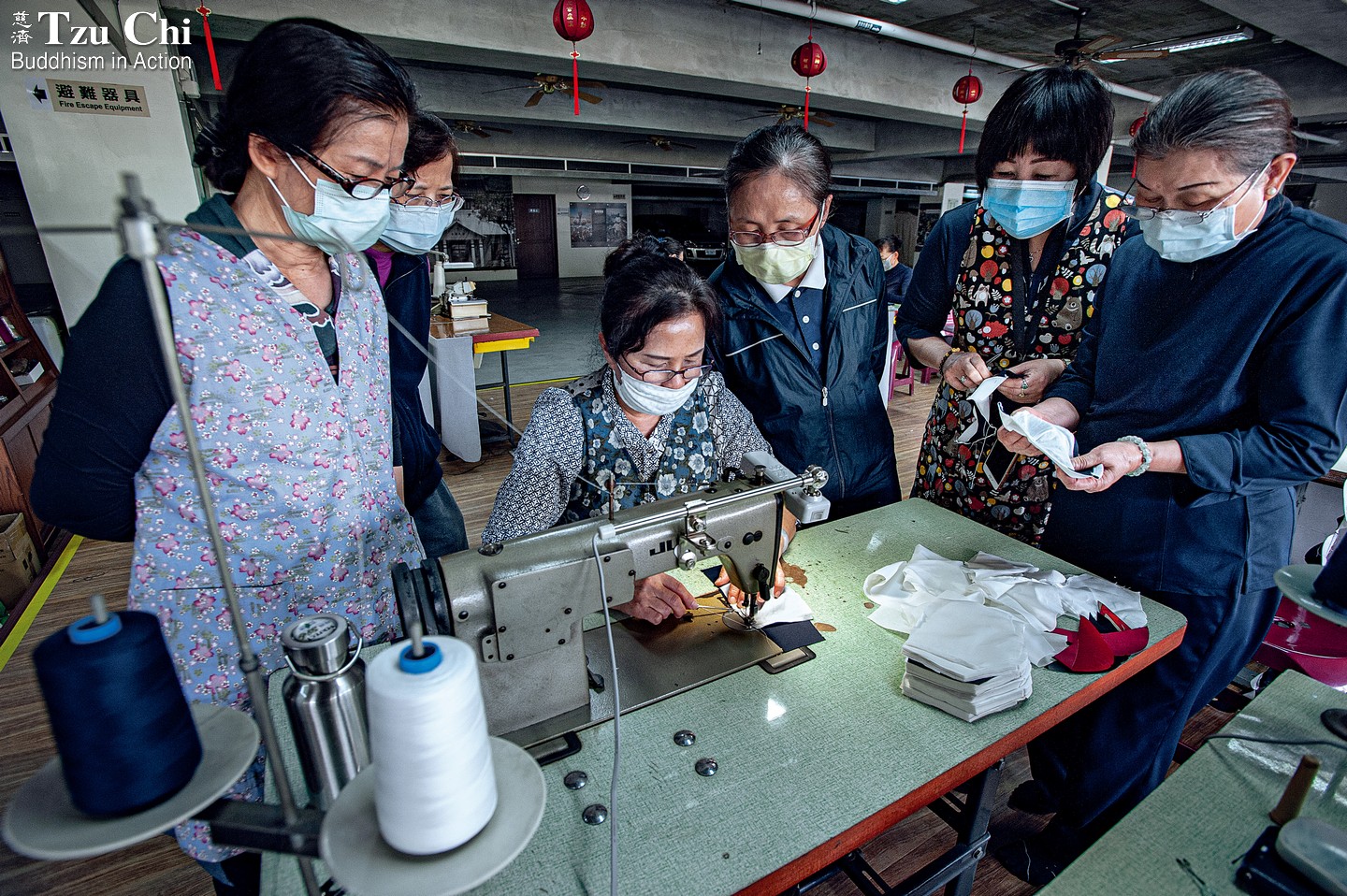
Cai Yue-li demonstrates to other volunteers how to sew a mask at a Tzu Chi sewing workshop in Shanhua, southern Taiwan. Everyone wants to do what they can to help during the rampant COVID-19 pandemic.
Making oneself useful
I met volunteer Lai Ruizheng (賴瑞徵) at another sewing workshop in Sanchong, northern Taiwan. The 70-year-old comes from Wuxi, Jiangsu Province, China. She came to Taiwan right before Chinese New Year to be certified as a Tzu Chi Honorary Board member by Master Cheng Yen in Hualien, eastern Taiwan. After she received her certification, she decided to spend the New Year with the Master at the Jing Si Abode. She spent ten days at the Abode, where she made herself useful by sweeping the floor and picking through vegetables.
She had planned to return to China on February 9, but then the coronavirus epidemic hit. Her family in China advised her to extend her stay in Taiwan. Later, other volunteers enlisted her help in making cloth masks. She wasn’t good at sewing, but she thought there had to be other work she could do, so she pitched in.
Starting on February 10, she began reporting every day to the sewing workshop in the Tzu Chi Sanchong Complex. Their production process consisted of tracing the mask patterns onto fabric, cutting the pieces out, sewing them together, inspecting the completed products, and ironing them. Volunteers worked in a sort of relay effort to turn out mask after mask. Lai’s job was to take apart defective masks. “At first we’d work every day until eight in the evening,” she said. “Then, when March rolled around and the demand for masks was no longer so high, we started leaving earlier.”
She explained that a lot of care was required in taking apart a mask so that the fabric wasn’t damaged. She was impatient with the process when she started, but Master Cheng Yen’s Dharma talks playing on the site helped calm her mind. She would tell herself how the Master always reminded her disciples to be mindful in their work, and that settled her down. Gradually she even began to enjoy her work.
Lai said that though she and her relatives and friends in China were temporarily apart, they met online every evening in a study group where they read works by Master Cheng Yen. She mentioned that the Master once said that the purpose of doing good deeds was not to garner fame, recognition, or spiritual merits. Instead, everyone should regard it their duty to give of themselves and serve others selflessly. Lai bore those words in her heart as she tried to contribute however she could.
Following the coronavirus outbreak, it became a common sight for people in Taiwan to stand in line at a pharmacy to purchase medical masks. Tzu Chi volunteers across the island took up mask-making to relieve the shortage so that more medical masks could be reserved for frontline medical workers and sick people. By contributing their time and strength, they hoped to help everyone pull through the COVID-19 crisis.
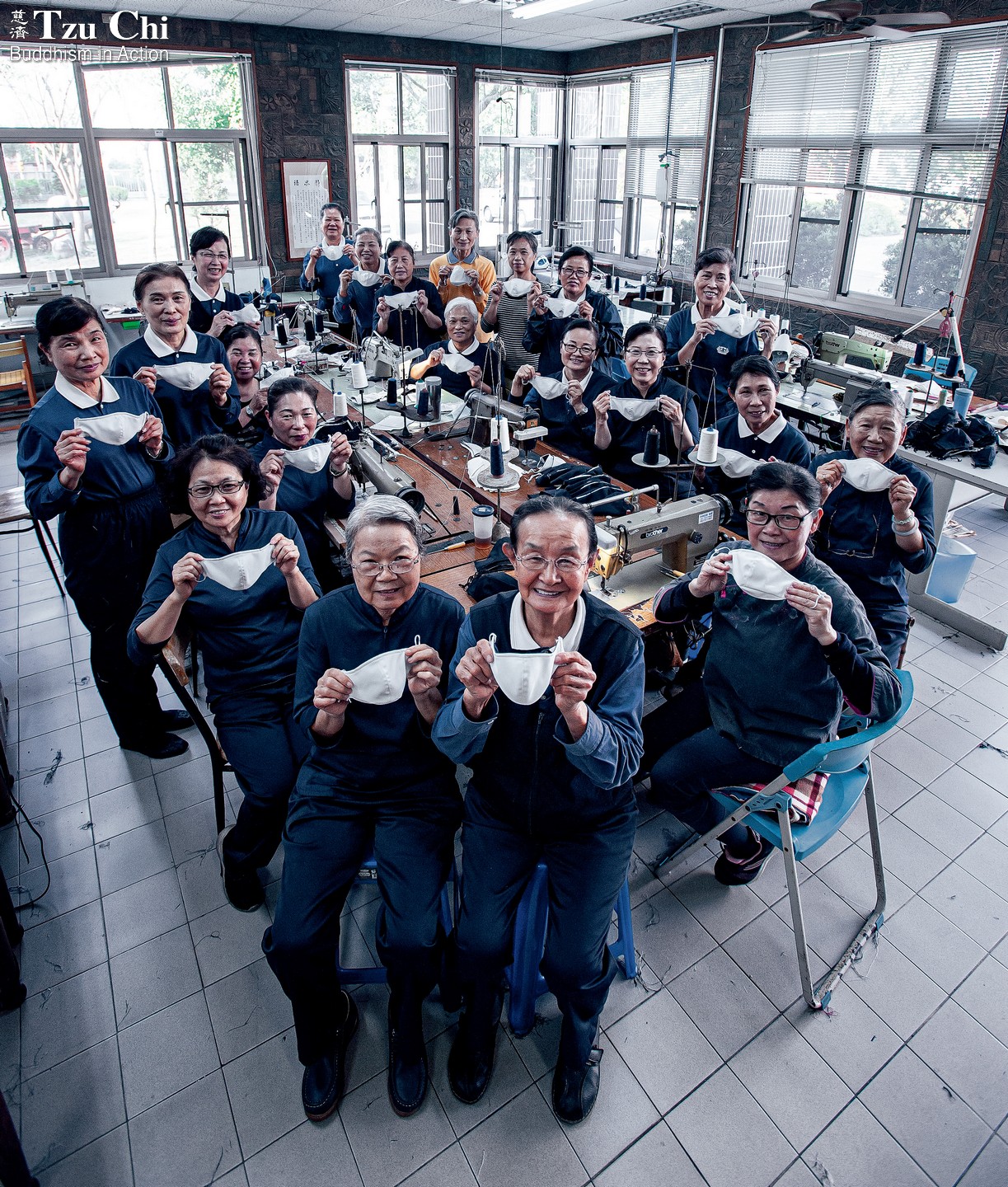
Volunteers pose with masks they have made at a Tzu Chi office in Jiali, southern Taiwan.
Cloth masks made by Tzu Chi volunteers. These masks were made with moisture-resistant fabrics provided by DA.AI Technology.
